Related Research Articles
The Scottish National Party is a regional Scottish nationalist and social democratic political party in Scotland. The SNP supports and campaigns for Scottish independence from the United Kingdom and for membership of the European Union, with a platform based on civic nationalism. The SNP is the largest political party in Scotland, where it has the most seats in the Scottish Parliament and 45 out of the 59 Scottish seats in the House of Commons at Westminster, and it is the third-largest political party by membership in the United Kingdom, behind the Labour Party and the Conservative Party. The current Scottish National Party leader, Nicola Sturgeon, has served as First Minister of Scotland since 20 November 2014.
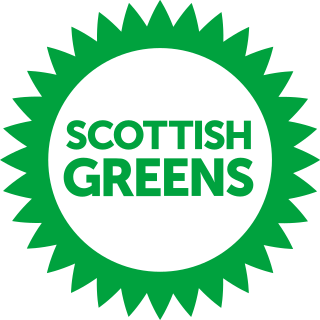
The Scottish Greens are a green political party in Scotland. The party has seven MSPs in the Scottish Parliament as of May 2021. As of the 2017 local elections, the party sits on six of the 32 Scottish local councils, with a total of 19 councillors. They hold two ministerial posts in the third Sturgeon government following a power-sharing agreement with the SNP in August 2021, marking the first time Green party politicians will be in government in the UK.

Scottish independence is the political movement for Scotland to become a sovereign state, independent from the United Kingdom.
The Highlands and Islands Alliance or Càirdeas was a minor Scottish electoral alliance that was active in the late 1990s. Founded in the Autumn of 1998 by non-partisan politicians local to the Highlands and Islands, it only contested the inaugural Scottish Parliament election of 1999, where it collected a negligible 1.3% of the regional vote and despite a reasonably publicised campaign, failed to elect any of its candidates. Led by anti-nuclear activist Lorraine Mann, the Alliance was established to better represent marginalised communities in rural Scotland, who they felt had been ignored by government in favour of those in the more densely populated Central Belt. Its policies were near exclusively centred on localism and rural issues, only contesting Scotland's regional additional member system so that electors could vote on nationwide matters through their constituency ballot. After the election, the group remained politically inactive until it was quietly disestablished in August 2004.

The Fishing Party was a political party in Scotland formed and officially registered in 2003. Largely a single-issue party, its formation was prompted by those involved in the fishing industry angry at cuts in the quantity of fish they were being allowed to catch as a result of the European Union Single Fisheries Policy. The rationale behind its formation was that they were in the best position to represent the fishing industry as they were part of it themselves. The party was led by George Geddes, formerly vice chairman of the Scottish White Fish Producers' Association, supported by the then Chairman Mike Park, with the aim of securing seats in the Scottish Parliament. The party was supported by Albert McQuarrie, the former Conservative Member of Parliament for Banff and Buchan, but he refused to stand as a candidate on the grounds of age.

The New Party was a neoliberal political party in the United Kingdom active between 2003 and 2010. The party described itself as "a party of economic liberalism, political reform and internationalism". It supported a smaller role for the state, a significant reduction in bureaucracy, renegotiation with the European Union and a strengthening of the special relationship with the United States.

The 2010 United Kingdom general election was held on Thursday 6 May 2010, with 45,597,461 registered voters entitled to vote to elect members to the House of Commons. The election took place in 650 constituencies across the United Kingdom under the first-past-the-post system.
Scottish Labour is a social democratic political party in Scotland. It is an autonomous section of the UK Labour Party. From a high of holding 56 of the 129 seats at the first Scottish parliament election in 1999, the Party has declined each election until getting just 22 MSPs elected at the 2021 election. The party currently holds one of 59 Scottish seats in the UK House of Commons.

The Scottish Conservatives, officially the Scottish Conservative & Unionist Party, is a centre-right political party in Scotland. It is the second-largest party in the Scottish Parliament and Scottish local government. The party has the second largest number of Scottish MPs in the House of Commons of the United Kingdom.
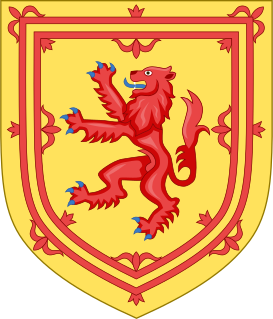
Scotland has elections to several bodies: the Scottish Parliament, the United Kingdom Parliament, local councils and community councils. Before the United Kingdom left the European Union, Scotland elected members to the European Parliament.
In Scotland, the Scottish Socialist Party (SSP) is a left-wing political party. The party was formed in 1998 from an alliance of left-wing organisations in Scotland. In 1999, it saw its first MSP returned to Holyrood, with five more MSPs elected in 2003. It lost all MSPs in the 2007 elections and has lacked representation in the Scottish Parliament ever since.
Archibald Hugh Stirling, Laird of Keir is a Scottish theatrical producer, a former officer in the Scots Guards, and Laird of the Keir estate at Lecropt in the Stirling council area in Scotland.
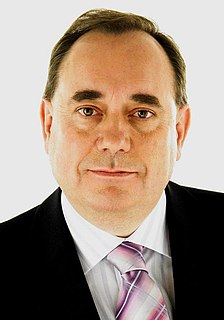
The 2007 Scottish Parliament election was held on Thursday 3 May 2007 to elect members to the Scottish Parliament. It was the third general election to the devolved Scottish Parliament since it was created in 1999. Local elections in Scotland fell on the same day.
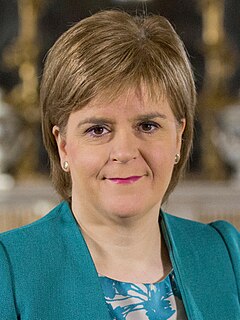
The 2021 Scottish Parliament election took place on 6 May 2021, under the provisions of the Scotland Act 1998. All 129 Members of the Scottish Parliament were elected in the sixth election since the parliament was re-established in 1999. The election was held alongside the Senedd election, English local elections, London Assembly and mayoral election and the Hartlepool by-election.

The Scottish Socialist Party is a left-wing political party campaigning for the establishment of an independent socialist Scotland.

The 2015 United Kingdom general election was held on Thursday, 7 May 2015 to elect 650 members to the House of Commons. It was the first and, as of 2021, the only general election at the end of a fixed-term Parliament. Local elections took place in most areas on the same day.
In the run-up to the general election on 8 June 2017, various organisations carried out opinion polling to gauge voting intentions. Results of such polls are displayed in this article. Most of the polling companies listed are members of the British Polling Council (BPC) and abide by its disclosure rules.

Centre Alliance, formerly known as the Nick Xenophon Team (NXT), is a centrist political party in Australia based in the state of South Australia. It currently has two representatives in the Parliament, one each in the House of Representatives and the Senate.
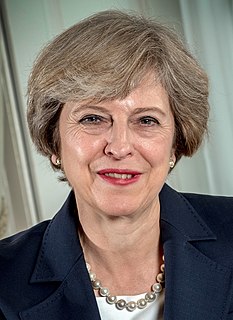
The 2017 United Kingdom general election was held on Thursday, 8 June 2017, two years after the previous general election in 2015 and was the first to be held on a day which did not coincide with any local elections since 1992. The governing Conservative Party remained the largest single party in the House of Commons but lost its small overall majority, resulting in the formation of a Conservative-led minority government with a confidence-and-supply agreement with the Democratic Unionist Party (DUP) of Northern Ireland.

Reform UK is a right-wing populist political party in the United Kingdom. It was founded as the Brexit Party in November 2018, and was renamed on 6 January 2021 after the completion of the UKs withdrawal from the European Union. The party was founded by Nigel Farage and Catherine Blaiklock with the stated purpose of advocating for Brexit. Prior to the UK's withdrawal from the European Union (EU), the party had 23 Members of the European Parliament (MEPs). Its largest electoral success was winning 29 seats and the largest share of the national vote in the 2019 European Parliament election in the United Kingdom.
References
- ↑ "Millionaire plans political party". BBC News. 4 January 2007. Retrieved 14 May 2017.
- ↑ Electoral Commission Archived 2007-02-27 at the Wayback Machine
- ↑ "Millionaire maverick plans 'what about us' party", The Scotsman , 5 January 2007
- ↑ Barnes, Eddie (7 January 2007). "New Scots party 'not founded to save UK'". Scotland on Sunday . Retrieved 14 May 2017.
- ↑ "Lib Dems offer SNP way out of independence impasse". The Scotsman. 2 April 2007. Retrieved 15 May 2017.
- ↑ "Stirling left speechless", Scotsman , 2 April 2007
- ↑ "Election cost Scottish Voice £21.06 a vote"
- ↑ "'Archie Stirling quits Scottish politics for good' - Daily Telegraph" . Retrieved 24 April 2012.